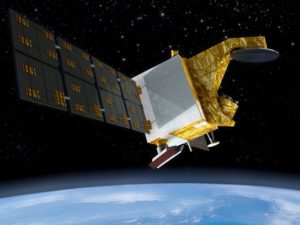
The President of the Centre national d’études spatiales (CNES), the French national space agency, spoke with Chinese counterparts on 10 December 2018 about Sino-French cooperation in space-based climate change monitoring, oceanography, environmental monitoring, space exploration, and space science.
Jean-Yves Le Gall addressed the preparatory meeting of the French-Chinese joint science and technology committee about space cooperation. During the day-long session, Le Gall also spoke with Wang Zhigang, China’s Minister for Science and Technology, Zhang Kejian, Administrator of the China National Space Administration (CNSA), and Wang Zhenyu, Head of the International Cooperation Bureau of the Chinese Academy of Sciences (CAS).
This cooperation follows last year’s 11th meeting of the French-Chinese joint space committee, where the committee identified climate change research and space exploration as the two priorities for space cooperation; this led to the signing of an agreement during the French President’s visit to China last January.
“France and China are developing an exceptional partnership in space, as illustrated by the success of the CFOSat oceanography satellite. In the short term, the next step is the SVOM astrophysics mission, which is proceeding according to plan,” Le Gall said at the meeting’s end. “Beyond that, today’s meeting enabled us to identify several areas of shared interest, which will be addressed at our next Space Science Survey seminar in October 2019. Thanks to CNES and CNSA, France and China are now accomplishing great things together in space and this partnership is set to grow in the years ahead.”
During the 10 December meeting, Le Gall reviewed the initial results from the CFOSat mission, launched in October, which aims to advance the understanding of winds and waves at the surface of the oceans and to measure their impacts on climate change. The first data from CFOSat will be available in a few months’ for use by weather services and scientific communities to achieve more precise forecasting.
Le Gall also set out a nine-point action plan for the partnership between China and France. It includes pursuing the major joint SVOM astrophysics mission, identifying a new Earth-observation mission focused on climate monitoring, establishing a framework for exchanging greenhouse gas data, seeking opportunities to work together on one of China’s planetary exploration missions, continuing cooperation in the field of oceanography, pursuing ongoing cooperation in space medicine, studying future opportunities for cooperation in astrophysics, studying the possibility of working together in materials science, and developing collaboration in space with academia.





